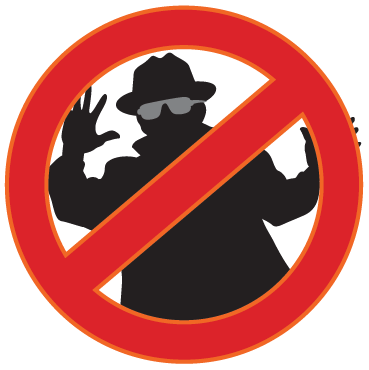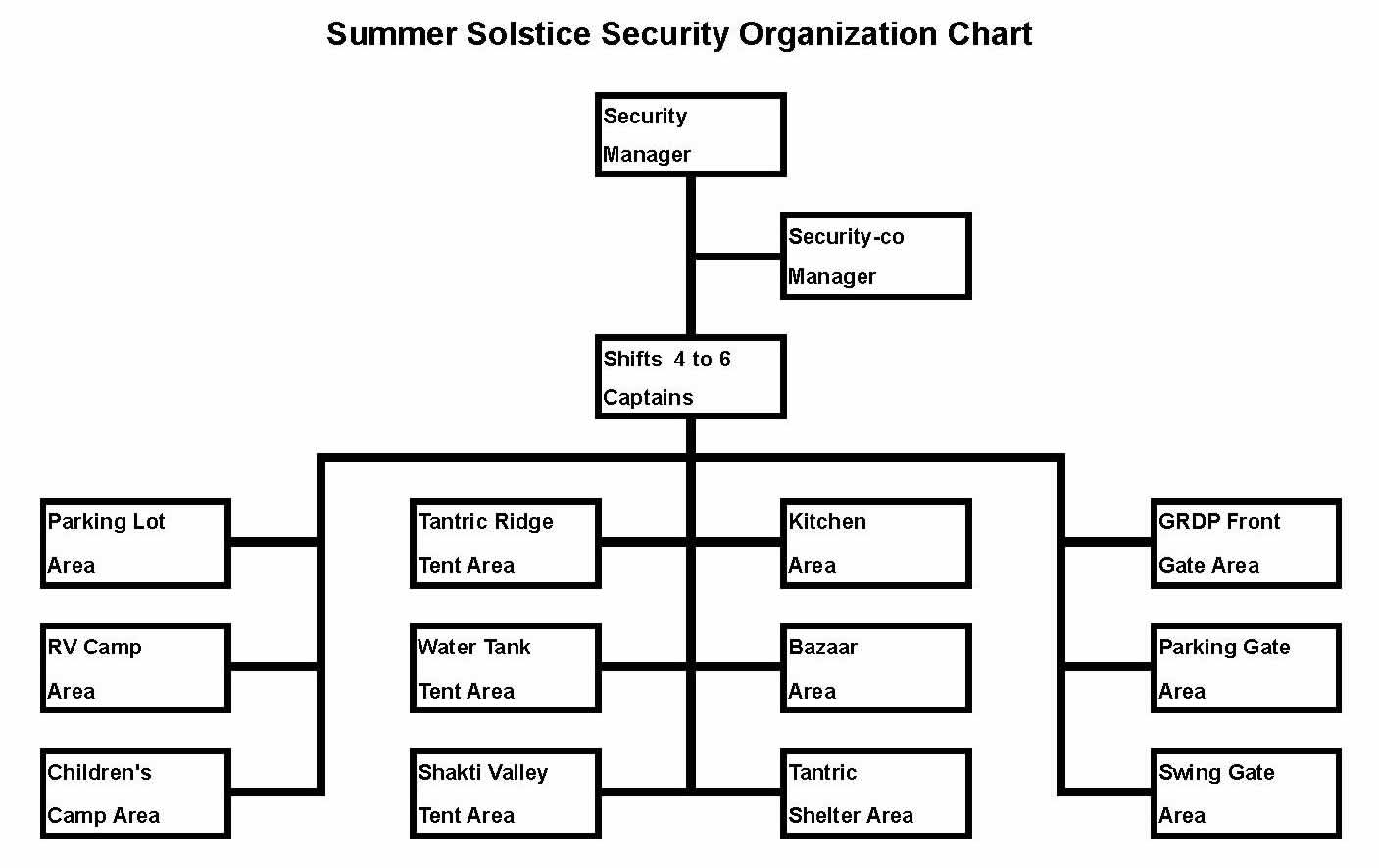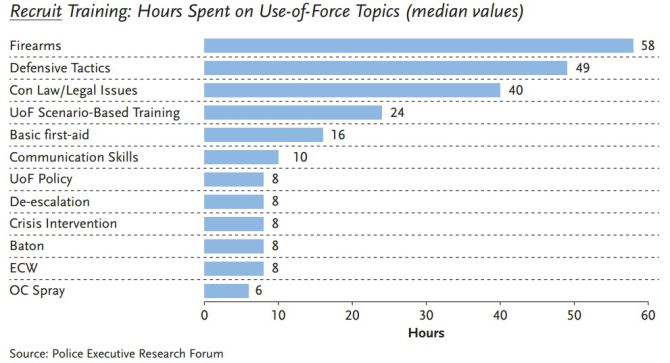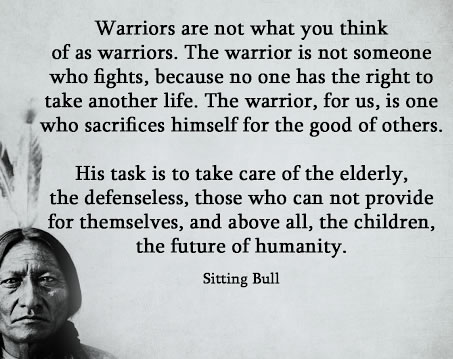3HOHistory.com
"Security is the absence of risk."
Interior Guard
Interior Guard is a term used to describe a Security Team
whose members are dedicated to the maintenance of
safe and secure environments within an organization. |
Security

Security does not happen by accident!
Security is those actions or systems, which prevent or minimize
the occurrence of adverse events within specific environments.
The most effective security is preventative as well as proactive,
and serves to minimize risk to life, property and environments.
|
Mission

1) Advocate for risk assessment procedures, which create heightened Security Awareness and Vigilance;
2) Advocate for actions and systems that serve to prevent or minimize risk to the welfare of people and property within specific environments;
3) Provide advisory and Informational resources upon request;
4) Provide Training resources upon request. |

Preface
THE FOLLOWING ORGANIZATIONAL STRUCTURE IS FOR THE
PURPOSE OF SECURING SOLSTICE SADHANA ENVIRONMENTS
Compiled by Ram Dhan Singh Khalsa and Hari Singh Bird Khalsa
along with the resources and collaboration of 3HOHistory.com.
Introduction
This special compilation is intended for the use of
Management as a Guide. It can be modified
as necessary to fit current circumstances.
Operational Structure
As proposed by Ram Dhan Singh and Hari Singh Bird and
implemented at the discretion of Solstice Sadhana Management.
Chain of Command
See Glossary 

Wilderness Survival Basics 
Winter Solstice Sadhana Map 
Summer Solstice Sadhana Map 
Duties of Security Team Members 
Solstice Sadhana Service Exchange for Team Members 
1. GENERAL MANAGER
a. The General Manager is responsible for the administration of activities at Summer and Winter Solstice Sadhana gatherings, hereinafter referred to as Solstice Sadhana, including the Safety and Security of all Solstice environments.
b. The General Manager's directives
are final except for those, which may originate from higher corporate authority.
c. The authority of the General Manager is commensurate with the level of responsibility subject to the limitations prescribed by Solstice Sadhana Policy and New Mexico and Florida State law as these pertain to the Summer and Winter Solstice Sadhana events respectively.
d. The General Manager may delegate authority to subordinates such as the Event Manager for the execution of details of this Chapter, but such delegation of authority shall in no way relieve the General Manager of the responsibility for Solstice Sadhana Security.
2. EVENT MANAGER
a. The Event Manager is charged with implementing Solstice Sadhana policies and procedures, and all directives from the General Manager. The Event Manager supervises the activities of the INTERIOR GUARD, i.e., the Security Team responsible for the safety and security of all Solstice Sadhana events and environments, hereinafter referred to as the Security Team.
b. In the absence of special instructions from the General Manager, the Event Manager will inspect the Security Team as often as considered necessary. However, the Event Manager will inspect the Security Team at least once every 24 hours, with emphasis on inspecting Security Stations during the hours of darkness. Whenever necessary, the Event Manager will direct inspections of the Security Team by subordinates.
c. In case of alarm, the Event Manager will act immediately to protect life and property and preserve order within all Solstice Sadhana environments. The Event Manager will also oversee the placement of fire extinguishers, first-aid equipment, the implementation of emergency evacuation drills, and supervise the education of Solstice Sadhana Attendees as to safety procedures to be followed during emergency events.
d. In the performance of duties, the Event Manager takes orders only from the General Manager.
e. Ensures that all staff members and volunteers who work with the children sign a release form and submit a set of fingerprints as part of a formal preemptive background check before being permitted to work with any children.
f. Maintain an Event Manager log, which contains a concise account of each tour of duty.
g. When formal Shift Replacement of the Security Team is prescribed, the Event Manager will examine the log of the Security Manager, and cause any errors therein to be corrected, and thereby affects the Shift Replacement of the Security Manager or Shift Captain prior to their being relieved. Once complete, the Event Manager will report to the General Manager for Shift Replacement.
NOTE: Security Team responsibilities include but are not limited to:
 Front Gate Check Point for Authorized Access and Interior Security
Front Gate Check Point for Authorized Access and Interior Security
 Implementation of Solstice Sadhana Rules of Conduct and I.D. Badge Protocols
Implementation of Solstice Sadhana Rules of Conduct and I.D. Badge Protocols
 Implementation of Background Checks for all Children Camp Guides
Implementation of Background Checks for all Children Camp Guides
 Adequate Staffing and Training of Security Team Members (User-friendly CPR procedure)
Adequate Staffing and Training of Security Team Members (User-friendly CPR procedure)
 Adequate Fire Prevention, Emergency Medical Response and First-aid Training
Adequate Fire Prevention, Emergency Medical Response and First-aid Training
3. SECURITY MANAGER
a. The Security Manager ensures the proper training and performance of essential duties by the Security team for the safety and security of all Solstice Sadhana events and environments.
b. The Security Manager ensures that all participants in the Solstice Sadhana event possess a Photo ID badge.
c. The Security Manager ensures that all members of the Security Team are correctly informed and trained as to the General Protocols, all Special Operating Protocols, and any additional duties, and that these are understood and properly implemented by Security team members.
d. The Security Manager will implement directives from the Event Manager only and will report directly to the Event Manager regarding any additional orders, which may be issued by senior corporate officers or executives.
e. The Security Manager will inspect the Security shift each shift at least once while on duty. The Security Manager ensures that the Security's equipment is in proper condition, and the SOPs for each Security Station are posted in their properly accessible location.
f. The Security Manager will keep the Shift Captain informed as to his/her location at all times.
g. The Security Manager is on call at all times.. When an emergency alarm is sounded, the Security Manager will respond immediately and, if necessary, call in a designated reaction team to report immediately. When a situation is sufficiently serious, the Security Manager will notify the Event Manager immediately as well as law enforcement, if appropriate.
h. The Security Manager ensures that shifts are posted on schedule.
i. Informs the Event Manager immediately of the occurrence of any suspicious, dangerous, or unusual events.
j. Notifies the Event Manager of any persons needing to be detained, and law enforcement if a law has been broken, but DOES NOT attempt to exercise physical control over such person(s) while awaiting appropriate action by the Event Manager or law enforcement.
k. Prior to a formal shift change, the Security Manager will examine the log of the Shift Captain, and cause any errors therein to be corrected, and affect the changing of the Shift Captains.
l. Security Manager sees to the procurement of all necessary supplies for the Security Team.
m. The Security Manager will act respectfully and gracefully with all people at all times and will teach and require the same of all team members. The concept of the "Saint Soldier" will be embodied by the Security Manager and taught and encouraged of all team members.
n. Security Manager ensures good communication with Law Enforcement seeking cooperative and effective interaction.
o. The Security Manager will make all effort to see that the Security Team provides a safe and secure environment whereby Solstice Sadhana participants may practice the teachings of Yogi Bhajan, including Morning Sadhana and White Tantric in order that they may be inspired and empowered to have a Healthy, Happy, Holy Solstice experience.
4. SHIFT CAPTAIN
a. The Shift Captain assists the Security Manager in ensuring proper training, discipline, and performance of duties of the Security Team.
b. The Shift Captain performs the duties of the Security Manager if no Security Manager has been assigned.
c. The Shift Captain obeys orders of the Event Manager and Security Manager.
d. The Shift Captain ensures that the property under charge of the Security Team is cared for and accounted for properly.
e. The Shift Captain assigns members of the Security Team Shift Replacements. The Assistant Shift Captain for each Shift Replacement assigns that Shift Replacement at Security Stations, and prepares a list of such assignments. The Shift Captain receives a copy of such lists, and based upon the lists, prepares a Security Team roster. The Security Team roster sets forth the Name, Security Station, and Shift Replacement, which is assigned for each member of the Security Team. The Shift Captain prepares the Security Team roster in duplicate, retains one copy, and submits the other to the Security Manager or the Event Manager, as appropriate, for approval. Once approved, no changes are to be made to the Security Team roster without permission from the approving authority.
f. The Shift Captain ensures that all Shift Replacements are turned out for posting at the proper time.
g. The Shift Captain ensures that the Assistant Shift Captain understands their duties thoroughly and that they carry out their duties promptly and efficiently.
h. The Shift Captain inspects the Security Team when directed by the Security Manager but must inspect each Shift Replacement at least once during each shift.
i. When absent from the Security Office, the Shift Captain directs the Assistant Shift Captain of the Shift Replacement on Station to perform Security Office duties until the Shift Captain returns. The Shift Captain will notify the Assistant Shift Captain of his/her location at all times.
j. The Shift Captain inspects the Security shift when directed by the Security Manager but must inspect each shift at least once during the shift.
k. Ensures that the Security Office and its surrounding areas are maintained in proper order.
l. Informs the Security Manager immediately of any dangerous, suspicious or unusual occurrence.
m. Immediately notifies Security Manager if an offender/intruder requires apprehension or detention.
n. Calls out the Security Team to deal with special circumstances whenever necessary.
o. Calls for an auxiliary Security team to deal with special circumstances whenever necessary.
p. The Shift Captain maintains the Shift Captain log and enters therein, concise accounts of all important and pertinent events, which transpire during the shift, which is an official record for Solstice Sadhana security.
q. The Shift Captain signs his/her name under last entry, and upon finishing the log.
r. The Shift Captain signs his/her name under last entry, and upon finishing, reports to the Security Manager.
s. Off-going Shift Captain ensures that the next Shift Captain is ready in time to form the oncoming shift, and post the oncoming shift at the proper time.
5. ASSISTANT SHIFT CAPTAIN
a. The Assistant Shift Captain supervises the members of the Security Team assigned to that Shift Replacement.
b. The Assistant Shift Captain performs the Security Office duties of the Shift Captain when the latter is absent from the Security Office.
c. Obeys orders only from the General Manager, Event Manager, Security Manager, or Shift Captain.
d. Assigns Sentries to Shift Replacements.
e. Prepares, in duplicate, a list showing the number of Shift Replacements, each member's name and assigned post. Retains one copy and gives the other to the Shift Captain.
f. The Assistant Shift Captain is required to know and understand the SOPs for every Sentry on the Shift Replacement. The Assistant Shift Captain forms the Shift Replacement in sufficient time to accomplish the following: issue equipment, inspect appearance, fitness for duty, condition of equipment. The Assistant Shift Captain instructs each member concerning orders and duties, and confirms their understanding.
g. When completed, the Assistant Shift Captain reports to the Shift Captain that the Shift Replacement is ready to be posted or, if directed, posts the Sentries without so reporting. Upon returning to the Security Office with the previous Shift Replacement, the Assistant Shift Captain collects Security Team property and dismisses the previous Shift Replacement. Upon completion, the Assistant Shift Captain reports to the Shift Captain along with the previous Assistant Shift Captain for Shift Replacement and posting.
h. The Security Station of the Assistant Shift Captain is the Security Office. When required to depart the Security Office in the performance of duties, the Assistant Shift Captain notifies the Shift Captain, who will assume those duties or designate another member of the Security Team to do so. Either the Shift Captain, the Assistant Shift Captain of the Shift Replacement on Station, or a member of the Security Team designated to perform the duties of the Assistant Shift Captain shall be present at the Security Office at all times. The Assistant Shift Captain allows no one to enter the Security Office without authority.
i. Immediately communicates with or sends a patrol to any Sentry who calls for the Assistant Shift Captain.
j. Forms his/her own Shift Replacement promptly for posting or when the Security Team is turned out. If his/her own Shift Replacement is posted on Station when the Security Team is to be formed, the current Assistant Shift Captain and oncoming Assistant Shift Captain Shift Replacement remain on Station. The Assistant Shift Captain will ensure that sleeping arrangements for all members of the current Shift Replacement can be easily located and arranged, and he/she is able to acquire these quickly and without confusion.
k. Reports immediately to the Shift Captain all violations of regulations and unusual circumstances or events.
l. Off-going Assistant Shift Captain ensures that the next Assistant Shift Captain is ready in time to form the oncoming Shift Replacement, and post this Shift Replacement at the proper time.
m. When a Sentry calls, "Shift Replacement," the Assistant Shift Captain relieves the Sentry and posts a Supernumerary or a member of the off-duty Shift Replacements, if the Assistant Shift Captain determines that Shift Replacement is necessary. If the Sentry is to be relieved for a short time only, the Assistant Shift Captain posts the Sentry again as soon as the necessity for the Shift Replacement ends.
n. The Assistant Shift Captain notifies the Shift Captain when any person needs to be detained by the Security Team, but DOES NOT attempt to exercise physical control over such person(s), while awaiting appropriate action by the Security Manager and/or the Event Manager.
o. Members of the Security Team who are off duty will remain on the Solstice Sadhana site, except when granted permission to leave by the Security Manager, in order to ensure adequate Security Team staffing in the event of any adverse event requiring an emergency response by Security Team members.
6. SOLSTICE SADHANA SENTRY
a. The main duties of the Solstice Sadhana Sentry are to: 1) remain alert, 2) be aware of any asymmetrical situations, i.e., those actions or events that are extraordinary, unexpected, or which put people and/or property at risk, and 3) quickly communicate via chain of command all actions and events that are extraordinary, unexpected, or which put people and/or property at risk.
b. Sentry members of the Security team are trained by the Security Manager or specially designated members of the Security team. Sentries must know and abide by the General Protocols for Security Stations. In addition, Sentries must know and implement any applicable Special Protocols for Security Stations. See Duties. See Uniform.
c. Members of the Security Team who are off duty will remain on the Solstice site, except when granted permission to leave by the Security Manager, in order to ensure adequate Security team staffing in the event of any adverse event requiring an emergency response by Security team members.
"Security is the absence of risk."
7. SUPERNUMERARY SENTRY
a. Supernumerary Sentries, i.e., Temporary Auxiliary Duty members of the Security Team must know and implement the General Protocols as well as any Special Protocols of the Security Station to which they may be assigned. (Also see GurdwaraSecurity.com.)
DECISION-MAKING FLOW CHART
Security Event Protocol

See Expanded Flow Chart here.
General Orders*
1. To take charge of this Security Station and all Solstice Sadhana property in view. See Sentry Description. See Flow Chart.
2. To walk my Security Station in an attentive manner, keeping always on the alert and observing everything that takes place within sight or hearing.
3. To report all violations of orders I am instructed to implement.
4. To repeat all calls from Sentries more distant from the Security Office than my own.
5. To quit my Security Station only when properly relieved.
6. To receive, obey, and pass on to the Sentry who relieves me, all orders from Officers of the Security Team and any messages from other Sentries.
7. To talk to no one while on my Security Station, except in the line of duty.
8. To give the alarm in case of fire, medical emergency or disorder.
9. To call the Shift Captain, in any case not covered by instructions.
10. To be especially watchful at night, and during the time for confronting, to question all persons on or near my Security Station and to allow no one to pass without proper authority.
11. To act respectfully, and with grace at all times.
12. To act only in ways as to provide Safe and Secure Environments whereby Solstice Sadhana participants may practice the teachings of Yogi
Bhajan, including morning sadhana, and in order that they may be inspired and empowered to have a Healthy, Happy, Holy Solstice Sadhana experience.
 *PROTOCOLS for Sentries at all Security Stations are based on the United States Marine Corps General Orders for Military Posts. Ram Dhan Singh Khalsa and Hari Singh Bird Khalsa, former U.S. Marines, compiled the above General Protocols especially for implementation at Winter and Summer Solstice Sadhana.
*PROTOCOLS for Sentries at all Security Stations are based on the United States Marine Corps General Orders for Military Posts. Ram Dhan Singh Khalsa and Hari Singh Bird Khalsa, former U.S. Marines, compiled the above General Protocols especially for implementation at Winter and Summer Solstice Sadhana.
SPECIAL OPERATING PROTOCOLS (SOPs) are additional Protocols for Sentries at specific Security Stations. These are based on conditions, which are unique to a particular Security Station, local requirements, or changing circumstances. SOPs are policies formulated and disseminated by Solstice Sadhana Management for implementation by the Security Team members. SOPs will be appropriately displayed for access by all Security Team members. In addition to SOPs, Shift Captains may give additional verbal and-or written orders, as necessary.
Important
The Solstice Sadhana Security Team is responsible for the physical safety and well being of the participants and the camp. The primary duties of the Security Team are to staff the camp entrance, monitor the flow of traffic (both pedestrian and vehicular) into and out of camp, patrol the entire camp, act as an information resource for all attendees, maintain order in the parking areas, and coordinate with other service areas, local law enforcement, and emergency response teams in the event of an emergency. Through the successful completion of our duties we hold the space for a peaceful and joyous camp experience for all.
NOTE: THE SOLSTICE SADHANA SERVICE EXCHANGE IS AVAILABILE. If you wish to serve as a member of the Solstice Security Team, contact us here. No previous security experience is necessary. All Security Team members are to be trained.
Security Team members are expected to rotate among the different Security Stations. This is the only camp service that operates 24 hours, which gives Security Team members a great opportunity to complete their exchange hours while no camp activities are taking place. Security Team members may be seated at the Front Gate or in the Security Office or patrolling the Site, the Bazaar, and the Tenting Areas. See Map. Security Team members are the first persons that attendees see as they arrive on-site. They are meant to be highly visible in camp while on shift; their priority is to be welcoming, knowledgeable, and firm. Security Team members must be able to give direction and hold boundaries regarding requests for information and assistance from attendees, badge display, parking and other security concerns. Security Team members exercise interpersonal communication skills while implementing and adhering to the Solstice Sadhana policies and Rules of Conduct as established by Yogi Bhajan.
PERSONAL PROTECTIVE CLOTHING AND GEAR FOR SECURITY DUTY: The Sentry Uniform is currently the Security Vest. This identifies you as Security Team personnel. The Vest is your projection of responsibility and authority in performing Security services. You must wear the Security Vest at all times while on duty!
NOTE: Most, if not all, of these items should already be in the possession of Solstice Sadhana Attendees.
a. Sturdy shoes (no flip-flops or sandals)
b. Clothing that covers your arms and legs that protects you from the sun and cold
c. Head covering and sun visor to protect your head and face
d. Sunglasses to protect your eyes
e. Coat and poncho to protect against inclement weather
f. Additional essential items: flashlight, whistle, water bottles, notebook and pencil, reliable timepiece
g. Personal First Aid Kit, i.e., sunscreen, lip balm, insect repellent, Band-Aids, personal medication, (e.g., aspirin, insulin, epinephrine)
IMPORTANT NOTICE: Do not dispense oral or injectable medications to others under any circumstances. Call the Security Office for medical assistance.
Sentries must always act as an asset to the mission. In other words you must be as self-reliant as possible, in order to be the most effective. Sentries must themselves be a secure presence.
SOLSTICE SADHANA SECURITY ORGANIZATION - LEVELS OF COMMAND
 First Level of Command is the SECURITY MANAGER, who is responsible for implementing Solstice Sadhana Security policies and procedures.
First Level of Command is the SECURITY MANAGER, who is responsible for implementing Solstice Sadhana Security policies and procedures.
 Second Level of Command is the SHIFT CAPTAIN, who is responsible for deploying Sentries to assignments, and supervising all Security activities on their duty Security shift.
Second Level of Command is the SHIFT CAPTAIN, who is responsible for deploying Sentries to assignments, and supervising all Security activities on their duty Security shift.
 Third Level of Command is the SENTRY, who is responsible for discharging the duties required at the Security Station or other Security Team assignments as required in the General Protocols, and Special Operating Protocols.
Third Level of Command is the SENTRY, who is responsible for discharging the duties required at the Security Station or other Security Team assignments as required in the General Protocols, and Special Operating Protocols.
GLOSSARY OF TERMS
INTERIOR GUARD IS A SECURITY TEAM whose members are dedicated to the maintenance of SAFE and SECURE environments within an organization.
SECURITY is those actions or systems, which prevent or minimize the occurrence of adverse events within specific environments. The most effective security is preventative as well as proactive, and serves to minimize risk to life, property and environments. See Important Advisory.
SECURITY OFFICE is the COMMAND POST for all Security related activities, communications and training.
REACTION FORCE is a special team of Security team members, which the Security Manager can call upon in special circumstances to assist in emergency situations as first responders.
CHAIN OF COMMAND is an orderly line of authority within the Security Team from Security Manager to Shift Captain to Sentry. The Chain of Command DOES NOT prevent personnel from directly communicating with each other, to ask for, or to share information. All security incidents must be reported up the Chain of Command for swift resolution. NOTE: Many security issues require confidentiality and discretion. These may not be discussed outside of your security duties.
SECURITY STATION is the stationary or roving post to which any Security Team member is assigned for the duration of a duty shift.
UNITY OF COMMAND means that every individual is accountable to ONLY one designated Supervisor, to whom they report at the start, during, and at the end of their Security Shift. See Chain of Command.
TRANSFER OF COMMAND is the process of moving the responsibility for the Security Command from one Security Manager to another, or from one Shift Captain to another. The Transfer of Command may change your direct supervisor. It is extremely important and essential that all incidents and open issues be communicated to the next shift so that continuity of collective information is not interrupted.
SENTRY DUTY includes walking and/or roving his/her Security Station in an attentive manner. Note: Circumstances cannot be allowed to preclude the implementation of adequate safety and security measures. This means standing upright and being aware of your surroundings. Sitting while on duty at your Security Station tends to make you feel too relaxed and therefore less attentive. This is not to say that you should not take breaks in order to sit down, relax, and drink water, but limit your breaks to periods of low activity. If there are two Sentries posted at your Security Station, alternate break times. Your mission is to take those actions and maintain those systems, which prevent or minimize the occurrence of adverse events, i.e., loss of life or property due to fire or medical emergencies, acts of trespass or other criminal activities within or around your Security Station thus ensuring the safety and security of Attendees and hazard-free, peaceful, and respectful environments. Security is an indispensable service that requires a commitment to serving others. There can be no security without sacrifice. Security requires sacrifice. NOTE: See Responsibilities of Security Team Members.
CHECKING IN AND OUT FOR DUTY. Sentries will check-in with the Shift Captain 15 minutes before start of shift to allow sufficient time for Transfer of Command, to receive their assignment, and to checkout their Security equipment. At the end of each shift, after being properly relieved, each Sentry will checkout with the Shift Captain, and check-in their Security equipment. See Marine Corps Interior Guard Manual.
RADIO CHECK-IN AND CHECK-OUT at Each Shift Change. Radio communication is limited only to the relevant Security communication needed for executing your assignment. Communications should use common language and terms. DO NOT use radio codes, shift-specific codes, acronyms, or jargon. Check with the Security Manager for Radio protocols, SOPs, on how to communicate by radio.
BEHAVIOR PROFILING is used to identify activities that are out of the norm. Executing behavior profiling starts with a cordial introduction, and an open-ended question like, “Sat Nam, what’s up?” By asking open-ended questions, people usually express their attitude and motive. “The meaning of your communication is the response you get.” If a person is defensive, they may relate to the moment as one of ‘intrusiveness', they may express authority issues, or they may be up to something. Making contact is better than making assumptions.
WHEN COMMUNICATION BECOMES CONFRONTATION
 Call the Shift Captain for backup.
Call the Shift Captain for backup.
 Maintain a safe distance, offer the person a drink of cold water, and keep the person talking until the confrontation de-escalates, or assistance arrives.
Maintain a safe distance, offer the person a drink of cold water, and keep the person talking until the confrontation de-escalates, or assistance arrives.
WHEN A SUSPECT IS OBSERVED IN THE COMMISSION OF A CRIME
 Direct the suspect to sit down and stop talking.
Direct the suspect to sit down and stop talking.
 Call the Shift Captain, and request law enforcement help.
Call the Shift Captain, and request law enforcement help.
 Do not touch, attempt to restrain, or attempt to take the suspect into custody.
Do not touch, attempt to restrain, or attempt to take the suspect into custody.
 Take a photo of the suspect and make notes about the incident.
Take a photo of the suspect and make notes about the incident.
 Do not attempt to stop a suspect if they run. Keep track of the suspect's whereabouts when possible.
Do not attempt to stop a suspect if they run. Keep track of the suspect's whereabouts when possible.
 Do not abandon your Security Station. --
Do not abandon your Security Station. --
Points To Ponder
"Form Follows Function Principle means that any hardware or
other equipment required to execute the mission must be based upon
the intended function and purpose, i.e., mindset, skills and procedures
need to be established and ready for implementation before acquiring supplies,
equipment, and support.* Hardware is considered last. Or, first know where you're
going and how to get there before you acquire the means. Policies and procedures
must be written and readily available for all staff members." -- SecurityAdvisoryTeam.com
Flawed Law Enforcement Recruit Training Schedule
*Communications and CI skills need to be given much more emphasis.

ECW = Electronic Control Weapons
Warrior's Creed

"Human
is a blend of Saint and Soldier (Sant Sipahi); this is a complete person.
If you are not a soldier your sainthood will be kicked around. If you
are only a
soldier, not a saint, you will start kicking others around." Yogi
Bhajan 8/6/1975
"Your value is not in how many experiences you have had.
It is in your stability -- in how much sacrifice you can do.
Your value is in how effectively and how consistently you can
live for others. Your value is in how you can take command of
yourself and others in any situation. Your value is in your capability
of firmly planting yourself in the neutrality of your higher consciousness
and standing as a pillar of strength, turning every negative to a positive.
Your value is how quickly you are there when the call comes." Yogi
Bhajan
"Forgiveness doesn't mean you forget what happened...
If something is serious and it is necessary to take counter-
measures, you have to take counter-measures." Dalai Lama

Security, Security, Security
By Singh Sahib Jot Singh Khalsa

S.S. Jot Singh Khalsa
It is my privilege and honor to share with you today around the topic of Security.
We have rich history of our gurus and their disciples being protectors of the weak and innocent. Our beloved Siri Singh Sahib Ji embodied this as well. He told us of tumultuous times that we would face and these may be upon us now.
So what are the things we can do to best secure and serve these times?
PERSONAL SECURITY - Which may often be overlooked - serves to reduce personal risk.
Many in the world are not so fortunate to have personal practices to balance themselves and a Sadhana which can provide sensitivity and intuition, enabling us to perceive potential danger around us, beyond what the eyes normally can see and what the ears may hear.
These practices will also afford us tolerance and non-reactiveness to deal with anything that the Creator brings before us. They also can provide the resilience and reserves to assist others in handling what they may be struggling to manage.
For the first 20 years the Siri Singh Sahib Yogi Bhajan taught us, he urged us to learn to protect ourselves. In New Mexico there were Survival Camps and an annual Ladies Camp for decades, where martial and military training and drills were very much a part of the programs.
Martial training, combined with a steady morning Sadhana can provide a precious, confident and intuitive presence to stand firmly and wisely amidst and against if necessary, the pressures of any situation of time and space.
In my teaching these days, I share that martial arts training is a perfect complement to Kundalini Yoga.
If you and I don't bring forth Saint-Soldier consciousness - who will? likely not most from the yoga or punjabi communities - I don't believe. If we don't embody that steadiness under pressure for our students and communities - who will?
Our yogic practices and our service help us to become Saintly, in my experience and from my observation. Training is required to be an effective soldier.
In the 37th pauri of Ekongkar Kaur's English translation of Japji Sahib - to manifest the Sant Sipahi/Saint Solider/Spiritual Warrior is among the highest incarnations.
In my teaching these days - I share that martial arts training is a perfect complement to kundalini yoga. For those not ready for what is often intense martial training - sinking deeply into Archer pose - with Long Deep Breathing - and Jaap Sahib playing in background - Can serve well to enable the capacity to become ferocious. Especially for a woman, this can be important. I believe all of you know archer pose. If not I'm happy to show you.
Aquarian Sadhana - 22 minutes - During the 22 minutes of sitting in Vir Asan (also referred to as Hero or Warrior Pose), with the hands in prayer pose, chanting the “Waheguru Wahejio” mantra with eyes open, staring and fixed at the tip of the nose, you will receive insights to enable and clarify your path to manifesting excellence within the realms that you are most passionate about. This multifaceted meditation, which is more than three times longer than any other segment of the Aquarian Sadhana meditations, also engenders the saint-soldier mentality -- an invaluable blend of elevated awareness and a relaxed preparedness, to embrace and act within any situation with greater insight, sensitivity, and without fear.
My martial training and my Sadhana provide me the greater likelihood that I may not react or be fearful when confronted by anything or anyone.
One of my prayers has been as Siblings of Destiny and the Khalsa Council, that through embracing our discipline we get beyond our fears and rigidity. This to best serve each other and humanity wherever we find ourselves. To manifest heart and soul, as the S.S. Sahiba urged in her opening address.
We sing it regularly, in the song of the Khalsa - something I believe the Our beloved teacher wanted to be ingrained in our psyches -'when things are down and darkest, that's when we stand tallest'. I ask how will you do that? If not through your well cultivated and refined discipline and through the grace of the One?
We create kirpans and refer to them as the worlds finest. I also refer to them as real kirpans - they are sharp, and often find myself saying ' why bother to carry a Kirpan that can not serve you to be a protector of the weak and innocent'. Most of what comes from India is not meant for that, and some of them are beautiful. Best seek out a bit of training, if you decide to wear a real Kirpan.
I suggested to someone just this morning to carry pepper spray. Especially if you are a woman. (check local laws as to legality to carry this).
COMMUNITY SECURITY Prior to any event your community is involved in sponsoring, it will be wise to look at insuring the environment will be secure. When Siri Singh Sahib Ji was with us, if you were on his personal Security detail his request, "Secure the environments!"
So whether you call upon a capable team of volunteers, possibly with law enforcement backup options or with law enforcement directly, the Security of your event is more likely assured.
At Solstice Sadhanda now has armed law enforcement with a highly visible presence. For over two years a volunteer, Security Advisory Team, S.A.T., including prior military service members, hold conference call meetings in which they collaborate with 3HO Solstice Sadhana staff members on how to best implement resources for maintaining a safe and secure Solstice experience.
At the very least - take it upon yourself to be observant and when anything doesn't look or feel right - tell someone responsible and capable or call law enforcement. If you are unable to take this action, then direct somebody who can be attentive and observant who will be able to act in a crisis.
As Sikhs we of course look different and may be seen as targets for those who do not know who we are, perhaps thinking we are terrorists.
 SECURITY ADVISORY TEAM This team advises 3HO Solstice Sadhana management on Security issues. This group is for those who have the inclination to develop their capacity to serve as a defender of the weak and protector of the innocent during Winter and Summer Solstice Sadhanas, by cultivating their potential as a saint-soldier. You are welcome to join us on our conference calls. This will help us to develop a culture of awareness of Personal Security as well as Community Security. SECURITY ADVISORY TEAM This team advises 3HO Solstice Sadhana management on Security issues. This group is for those who have the inclination to develop their capacity to serve as a defender of the weak and protector of the innocent during Winter and Summer Solstice Sadhanas, by cultivating their potential as a saint-soldier. You are welcome to join us on our conference calls. This will help us to develop a culture of awareness of Personal Security as well as Community Security.
 SANT SIPAHI ADVISORY TEAM The group that will eventually send representatives out to our various communities to explore the ways and means to insure Security within ashram and Gurdwara communities. The Sant Sipahi Advisory Team works on the premise that all Security is local and must start at the personal level - with each person taking responsibility for their individual safety and those around them. Once this awareness is in place at the individual level, S.S.A.T. will work to provide resources, training and support. (See GurdwaraSecurity.com.) SANT SIPAHI ADVISORY TEAM The group that will eventually send representatives out to our various communities to explore the ways and means to insure Security within ashram and Gurdwara communities. The Sant Sipahi Advisory Team works on the premise that all Security is local and must start at the personal level - with each person taking responsibility for their individual safety and those around them. Once this awareness is in place at the individual level, S.S.A.T. will work to provide resources, training and support. (See GurdwaraSecurity.com.)
All are welcome to join this most noble endeavor to ensure the safety and Security of our Dharma. Please let me know at these meetings if you have any interest and you will be added to our mailing list.
Thank you for your kind attention! --
See 3HOLegacyLinks.com.
Note: If you want to serve as a member of the Winter Solstice Sadana or Summer Solstice Sadhana Security Team, contact us here. No previous security experience is necessary. All Security Team members will be trained.
|


3HO Legacy Links
Memories, Moments, and Missives
See more at 3HOLegacyLinks.com. 
Memories to share? Register here.
Pages And Points To Ponder
MySikhSense.com














































3HO
ACT
Akal
Forum
Profiles
Yogi Tea
Sadhana
About Hair
Stretch Pose
Chardee Kala
My Real Name
Early
3HO Photos
Later
3HO Photos
Obama43To1.com
The Mahan Tantric
White Tantra Yoga
The SikhNet Story
Our
Family Photos
Before 3HO
Photos
Diversity Dialogues
Letters
and Lessons
Solstice Sadhana Diet
First Solstice Sadhana
Yogi Bhajan's Teacher
All for One Won for All
The Case For Dialogue
SensitivitySummit.com
To
Serve Is To Succeed
Solstice Sadhana Rules
Christmas In New Mexico
Bibiji Inderjit Kaur Khalsa
Solstice Sadhana Security
The
Essence ... You Are IT
Yogi Bhajan's First Student
Ma Bhagavati...in Memoriam
The
Grace of God Meditation
Jot
Singh's Early 3HO History
Advisory To 3HO/Sikh Dharma
Summer
Solstice Sadhana 1973
This Is What Racism Looks Like
Awtar
Singh's Early 3HO History
Kirpal
Singh's Early 3HO History
The Songs of Livtar
Singh Khalsa
The
Solstice Sadhana Experience
A Gallery of 3HO Legacy Teachers
An African American Critiques 3HO
Rise Up Rise Up Sweet Family Dear
Hari Jiwan
Singh's Early 3HO History
The Yogi Bhajan Library of Teachings
Guru Fatha
Singh's Early 3HO History
Sat
Santokh Singh's Early 3HO History
The
Ubuntu Age - All for One, Won for All
The
Sikh Who Changed Modern-Day India
Remembering Sat Nam The
Grace Within You
More Video Stories of The Master Yogi Bhajan
The
1974 Transition of Bhai Sahib Dayal Singh
Ending The Age of Me - Beginning The Age of We
Guru Singh's History of Summer Solstice Sadhana